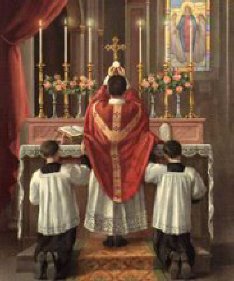Archbishop Nichol gives no shred of encouragement to those who want the Tridentine Rite to replace the newer version. Conference participants “will wholeheartedly celebrate the Mass in each of these forms”, he instructs them bluntly, adding: “The view that the ordinary form of the Mass, in itself, is in some way deficient finds no place here.” People who hold that view are “inexorably distancing themselves from the Church”, he says. There is no scope, in other words, for “Tridentine Rite” parishes that set themselves up in the spirit of being “more Catholic than thou”. Recognising the threat of such moves, Archbishop Nichols is seeking to nip a potential schism in the bud. His firm leadership in Westminster is one that other bishops in England and Wales – and elsewhere – will welcome. The Catholic Church does not need its own version of “culture wars”, and in his message the archbishop in effect declares a priest’s personal tastes or preferences to be irrelevant.
This seems to contradict the views of Pope Benedict XVI. In Revue Theologisches, Vol. 20, Feb. 1990, pgs. 103-104, then Cardinal Ratzinger stated:
The liturgical reform, in its concrete realization, has distanced itself even more from its origin. The result has not been a reanimation, but devastation. In place of the liturgy, fruit of a continual development, they have placed a fabricated liturgy. They have deserted a vital process of growth and becoming in order to substitute a fabrication.They did not want to continue the development, the organic maturing of something living through the centuries, and they replaced it, in the manner of technical production, by a fabrication, a banal product of the moment.
In the preface to the French translation of Monsignor Klaus Gamber's most famous book, Die Reform der römischen Liturgie (The Reform of the Roman Rite) then Cardinal Ratzinger stated:
What happened after the Council was altogether different: instead of a liturgy fruit of continuous development, a fabricated liturgy was put in its place. A living growing process was abandoned and the fabrication started. There was no further wish to continue the organic evolution and maturation of the living being throughout the centuries and they were replaced -- as if in a technical production -- by a fabrication, a banal product of the moment. Gamber, with the vigilance of a true visionary and with the fearlessness of a true witness, opposed this falsification and tirelessly taught us the living fullness of a true liturgy, thanks to his incredibly rich knowledge of the sources. As a man who knew and who loved history, he showed us the multiple forms of the evolution and of the path of the liturgy; as a man who saw history from the inside, he saw in this development and in the fruit of this development the intangible reflection of the eternal liturgy, which is not the object of our action, but which may marvelously continue to blossom and to ripen, if we join its mystery intimately.






